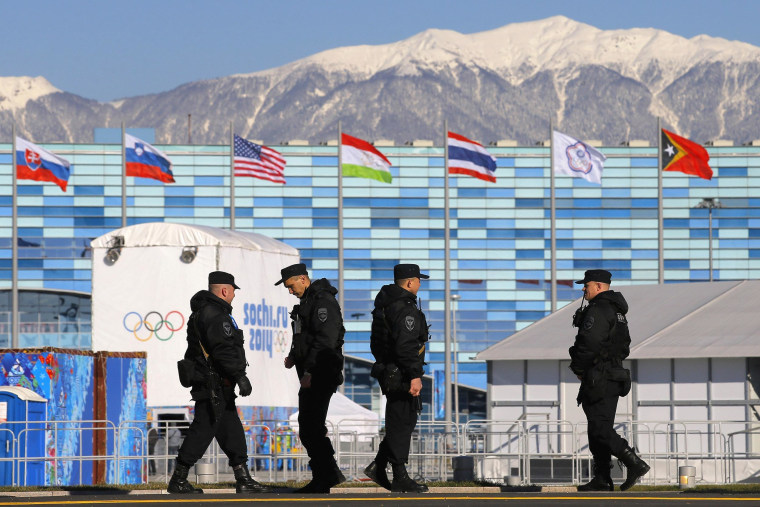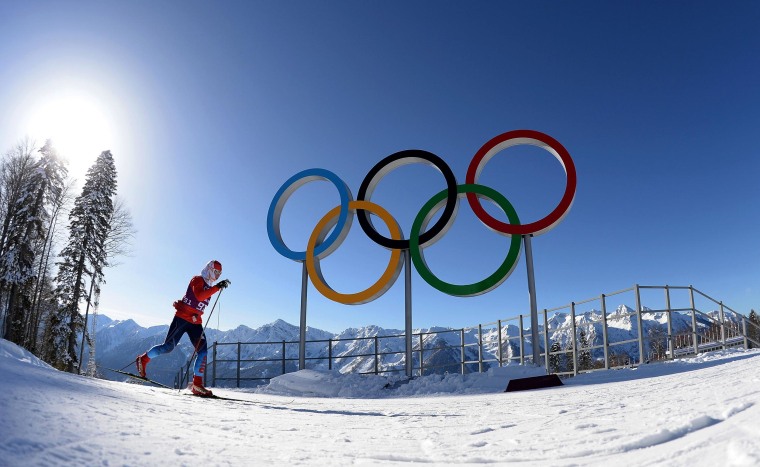SOCHI, Russia — The Winter Olympics about to start in this coastal resort city are unlike any in recent memory — promising the glow of international harmony and fierce competition but opening in the shadow of terrorism, politics and uncertainty.
Almost 3,000 athletes from a record 88 countries will be represented here, in a little-known, subtropical Black Sea resort that has been transformed — with an eye-popping $51 billion of Russian money — into a gleaming treasure chest of venues for the world's biggest sports stage.
Shani Davis, streaking around the Adler speedskating oval, and Shaun White, twisting high above the halfpipe at Krasnaya Polyana, will try to become the first American men to win gold in the same event at three straight Winter Olympics.
At the Bolshoy Ice Dome, the U.S. men's hockey team will aim for its first gold since the 1980 Miracle on Ice. To do it, the Americans will have to top Sidney Crosby, trying to lead Canada to a repeat gold, and Alex Ovechkin, who hopes for the first Russian title since the Soviet era.
The boundaries of human achievement will be pushed. Olympic feats will defy belief. Color will explode before viewers around the world. And that's just the Norwegian curling team's pants.
Bode Miller, the American skier, will be at the Winter Olympics for the fifth time. The African nation of Zimbabwe will be here for the first, represented by a lone Alpine skier.
Olympics under threat
It will all take place under the inescapable specter of terrorism — on the minds of the athletes, their families, the organizers at the Russian government, especially since two bombs exploded in the city of Volgograd in December.
Nobody knows whether the militants of the Caucasus, the war zone next door, can or will make good on their repeated threats to stage a terrorist attack and humiliate President Vladimir Putin.
Nobody knows how impenetrable the vaunted "ring of steel" security zone — 1,500 square miles in all, fortified by 40,000 Russian troops, built to ward off just such a threat — will prove to be.
It seems certain that attention will be drawn to what human rights groups say is Russia’s deplorable record on gay rights, but nobody knows how athletes and fans will voice their opposition, or what the punishment will be.
And, of course, nobody knows what Putin himself has up his sleeve. These are his Olympics as much as they are Russia’s, and the president has spent $50 billion to seize his moment on the world stage.
The sight of the president lovingly stroking a snow leopard perched on his lap, at an event three days before the opening ceremony to promote environmentalism, seemed only to underscore the Russian Olympics as a singular event.
Organizers: 'Assured' on safety
Olympic organizers have found themselves spending more time reassuring the world about security than they have promoting the new events of slopestyle and team figure skating, or the mountain vistas of Rosa Khutor.
"I have been assured before coming here, and I am still assured being here," Thomas Bach, the head of the International Olympic Committee, said this week.
Some of the athletes, including some of the 230 Americans competing in Sochi, have not been so sure. Several of them told their families not to come, and the U.S. ski and snowboard team hired private security.
The U.S. Navy positioned two warships in the Black Sea to help in the event Americans need to be evacuated, although military officials have stressed for weeks that Olympic security is the responsibility of the Russians.
Putin, in a visit to the Olympic village on Wednesday, tried to play up international cooperation on counterterrorism, though American officials have expressed frustration that the Russians aren’t sharing more information.
In an illustration of the international tension surrounding the games, Putin pointed out that terrorism visited the Boston Marathon in the United States last year, and London during a G-8 meeting eight years ago.
Security "always worries everybody," Putin said, "not only for major international events, but also for major political events."
Putin has staked the safety of the games on the same strategy the Soviet army used to defeat Hitler, a layered approach known as defense in depth: Accept some casualties on the outside and protect the vital core, in this case the Olympic zone.
Twin bombings in the city of Volgograd in December killed 34 people, and Russian security forces have waged a prolonged fight with militants in the Caucasus. But Russian officials have vowed that the "ring of steel" will be absolute.
"The American approach since 9/11 has focused much more on synthesizing, integrating, targeted information about networked threats," said Andrew Weiss of the Carnegie Endowment for International Peace, an NBC News analyst.
"The Russian approach is much more about a traditional show of force, flooding the zone with security personnel," he said.

Other issues stalk the games
Problems arrived in Sochi well ahead of the torch.
Reporters traveling from around the world to cover the Olympics found the accommodations less than inviting — cold water coming from the showerheads, brown water coming from the sinks, stray dogs meandering through hotel lobbies.
About those dogs: There was an international outcry after reports that they were being hunted down and killed, perhaps by the thousand, after a local company won a contract to clear the streets of strays.
Olympic athletes had their own safety to worry about. In the mountains, officials scrambled to make changes to the course in the new event of slopestyle after a top Norwegian athlete broke his collarbone and dropped out of the games.
Shaun White, one of the American stars, jammed his wrist training on the same course, and announced that he would pull out of slopestyle, focusing instead on winning his third straight gold medal in halfpipe.
And there is no shortage of other potentially happier stories on the ice and slopes. Meryl Davis and Charlie White will try to dance their way past Canadian rivals, and skier Mikaela Shiffrin will hope to claim the mantle of Lindsey Vonn. Plus, the U.S. could have four medal winners on the Alpine slopes for the second games in a row.
Meanwhile, Yuna Kim, South Korea's mesmerizing queen of the ice, will try to repeat her figure-skating gold. And Nordic combined skier Todd Lodwick, 37 years old and the first six-time Winter Olympian from the United States, will carry the American flag into the opening ceremony on Friday night.
"I wouldn’t have gotten to this point of my career without the support of my family, friends, for sure teammates, and sponsors along the way,'' he told TODAY on Thursday. "Just tell them that I appreciate it, and I’m going to do my best while I’m here."
Gay rights record looms
But the Sochi Olympics have been notable for the amount of attention they have drawn for issues outside the competition venues.
Gay rights organizations have planned protests around the world and on social media during the Olympics to draw attention to Russia’s laws criminalizing homosexual "propaganda" and restricting gay adoption.
In a snub, President Barack Obama and Vice President Joe Biden both elected not to attend the opening ceremony, naming instead an official American delegation led by three openly gay Olympians (one of whom had to cancel on the festivities Wednesday).
Putin made matters worse when he said before the games that gay fans, athletes and journalists would have nothing to worry about in Sochi — provided they leave the children in peace.
The International Olympic Committee has warned athletes not to use the medals podium to object to Russia’s anti-gay laws or express any other political opinion. The Olympic charter forbids it.
But athletes are free to speak their minds elsewhere, and some already have. Ashley Wagner, an American figure skater, joked to reporters on Wednesday that the multicolored Sochi 2014 designs reminded her of a rainbow flag.
"I just believe in equality for all," she said.
The IOC, for its part, has tried to keep attention off the controversies and on the competition. Mark Adams, an IOC spokesman, pointed out that more than 40 heads of state will visit the games, and he said that only a small number of hotel rooms have problems.
"It’s a bit premature to say it’s been a failure," he said. "Surely there have been some issues, but we are really doing our best."
It's about the games
Premature indeed. Barring a calamity, these Olympics will be remembered by the viewers and athletes for the medals and the miracles.
Even on Opening Day, there will be some action to be enthralled by. Like U.S. skiers Miller and Julia Mancuso — with nine Olympic appearances and eight career medals between them — going for a second round of downhill training starting at about 1 a.m.
The opening ceremony is a chance for Russia to show itself off to the world. The events will take place inside recently completed Fisht Stadium. Organizers promised Friday that it would combine Russian history, art and music — and offer a twist on the traditional parade of nations.
The venue's name came from a nearby mountain, and its design is said to have been inspired by Russia's jewel-encrusted Faberge eggs. Like intricate artwork itself, the stadium has open sides, allowing people inside to take in the Caucasus Mountains and the Black Sea — a view as spectacular as the games themselves promise to be.
The Associated Press contributed to this report.
